#essay
Link
In today’s new Longreads essay, Montserrat Andrée Carty writes about family and identity, growing up around different languages and cultures, and eventually embracing (and loving) her name over time.
We seek to become the truest version of ourselves, but what if there isn’t one true version, but multiple? Like father, like daughter, there are two versions of me.
At 5, I spoke all these languages fluently. Today, I only speak two of them, but understand all of them in some way, as they still live inside me.
Read her beautiful personal essay on Longreads.
239 notes
·
View notes
Text
I'm writing an essay about Batman, the batfam, and their similarities to cults, if you even care...
But seriously, it's like 4 pages so far and I only got through behavior in the BITE Model, soooo
Please give me examples of any toxic or manipulative or just down right ick Batman (or Batman in general, that can tie in too) behavior, with proof preferably. I know there's a lot of it, and so do you.
#batfam#batman#dc#nightwing#robin#red hood#red robin#essay#also#spoiler#I'm too tired for this#signal#i forgot his name#im sorry#verry sory#ummmm#orphan#dick grayson#stephanie brown#duke thomas#jason todd#damian wayne#also the other one pls#i don't feel like listing everyone#but#alfred pennyworth#he probably has plenty too
43 notes
·
View notes
Text
It seems like one of the biggest and most common mental hangups I find in almost everyone is a failure to adapt to superseding concepts.
That's to say, sometimes, earlier on in life or in understanding of something, you will be told a simplified version of the truth, often a black and white silhouette of an idea. However, the more you learn, the more you're meant to find the shades, the blurriness, the nuances of everything. It seems like many people don't understand this, or more accurately, are never rewarded for doing this.
The issue seems to be that on a rhetorical level, the most easily transmissible ideas are those black and white statements, the ones that punch the best. Most people don't attempt to engage in concepts on a deeper level out of their own interest, so if all they are surrounded by is surface level statements, their understanding of the world will never advance beyond a surface level.
This is what happens with bigots when they are confronted with actually interacting with the people they choose to hate on a more personal level. To even speak to someone is to treat them in some way as a person, and so, while they almost never budge on anything that doesn't directly affect their life even after these sorts of learning experiences, they are forced to add shade on something they desperately want to be black and white. Obviously, many people's delusions win out even with direct contact, but still.
This also most certainly affects leftist spaces. It feels like there are two different kinds of leftist spaces, ones where the solution to differences is to put up harsh walls and outlines between everything and police those rules strictly, and the other where the solution is to let them intermix and talk it out. It's sadly difficult to simply cast away that first one, the silhouette, when it comes to politics, because even progressive groups need to consolidate together to push on a rhetorical level for cultural acceptance and systematic changes, but the internals cannot reflect this idea, because it simply isn't how anything should work. It's a defensive reaction to difference, drawing lines around yourself so everything makes clear and simple sense.
Absolutism is a philosophy for children, but that doesn't mean it's bad. It just means that we're meant to graduate from that eventually. Allow yourself to see the grey, and you might find that there's a beauty to the shading.
#advice#essay#essay writing#mini rant#rant post#rant#personal rant#politics#sociology#learning#special interest#writing#mini essay#rhetoric
39 notes
·
View notes
Text
Just felt like I haven't re-read TSH in a while. So I wondered if I could write a full blown essay (not really, more like a brief analysis) on the characters from TSH.
I might not even end up writing them but I would like to know which characters people are most interested in learning in-depth about.
There's so much to say about this story that no one can ever stop analysing it. If Donna took 10 years to complete it, there must be so much we can discuss about it!!!
I will try to write a detailed analysis when I have the time to re-read TSH (studying for exams, writing a book and reading "The Bell Jar" and "Pet Sematary" for the 1st time lol)
I hope this will inspire people to make more post abt TSH theories/analysis/thoughts (been tired with the regular mood boards and quotes)
(PS: "Looking Through The Male Gaze" for Camilla is about Richard's gaze, not Donna Tartt's)
#dark academia#the secret history#tsh#donna tartt#chaotic academia#henry winter#richard papen#charles macaulay#camilla macaulay#francis abernathy#bunny corcoran#julian morrow#writing#essay#analysis#polls
26 notes
·
View notes
Text





Balancing the melancholy in all the spring bright.
From What Are You Going Through by Sigrid Nunez // Woman At Point Zero by Nawal El Saadawi // Forward from A Room of One's Own by Virginia Woolf
#dark academia#literature#novel#quote#essay#in translation#translated#writers#book quotes#prose#chaotic academia#reading#books#writing#lit#virginia woolf#a room of one’s own#sigrid nunez#what are you going through#nawal el saadawi#woman at point zero#women’s literature#women writers#mary gordon#feminist literature#light academia
21 notes
·
View notes
Text
The RalsAlmanac, Volume I
Okay, here it is! A series of essays that will attempt to definitively explain just who or what Ralsei is, referring to scenes from the game as evidence, as well as external sources where appropriate.
There will be some conjecture, as there's just so much we don't know about him, and what little we are given isn't exactly the most revealing. However, I've done my best to cleave as closely to the source material as I can, and I believe there's a strong case to be had here.
Hopefully you'll be able to see where my points come from, or at the very least you'll learn something you didn't know before. Either way, thanks for your consideration!
Volume I - Ralsei Is A Character In A Role-Playing Game.


Self-indulgent reference out of the way, lemme ask you a question.
Who is Ralsei?
It's a question that seems like it should be easy to answer. He's the Prince From The Dark, the third of the three Delta Warriors, he exists to serve the lightners, and is the most precious little cinnamon roll that ever lived. He enjoys baking and crochet, can hold a tune, is a decent interior-decorator, and holds his friends Kris and Susie in very high regard.
Thing is, that's about all you can really say about him without veering into speculation and headcanons, and they're more surface-level observations than anything else. What exactly does "Prince From The Dark" mean, for instance? Prince in what sense, exactly? Ceremonial, or with the actual power that royalty conveys? Where does he rank in comparison to, say, King or Queen, both actual rulers of actual kingdoms? The title of "prince" would suggest that he answers to them, but while they rule their own municipalities, Ralsei's title implies he rules over ALL dark worlds. You could go on asking these questions forever, but I think you see what I'm getting at.
A more productive avenue of questioning might be: What role does Ralsei play in the story of Deltarune? Perhaps more of his underlying character and motivation could be gleaned by looking at what he does for the story and the game. And this would be correct... sort of.
We tend to think of him as the squishy healer of the party, the Heart and moral centre of the Fun Gang. And he absolutely is that, but he's also quite a bit more. He plays all sorts of different roles and character archetypes in the first two chapters of the game, including but not limited to:
the old man whose purpose is to wax poetic about the ancient prophecy...

the know-it-all tutorial fairy who walks you through the basic game mechanics...
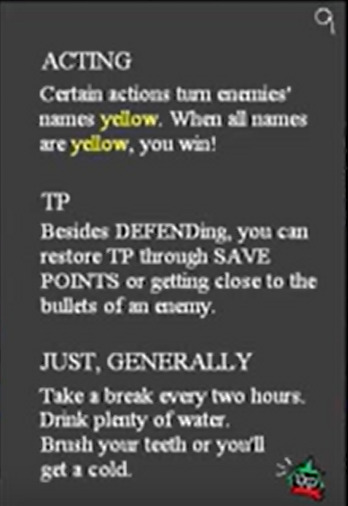
the straight-man DM trying to keep everything on the rails...

the young sheltered noble experiencing the outside world for the first time...

the demure love-interest to the main protagonist...
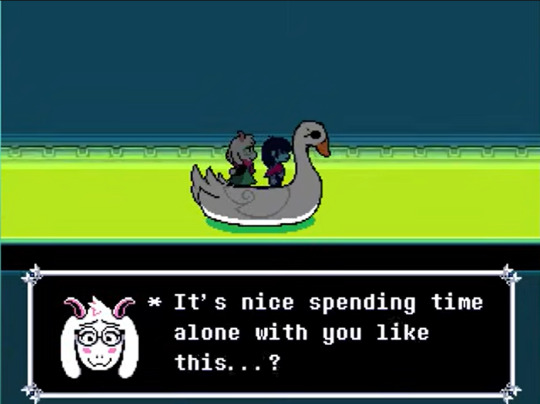
the Polyanna determined to see the good in everybody...
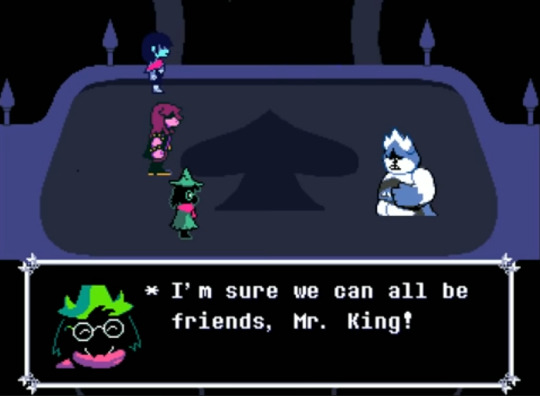
the mysterious waif who knows things he shouldn't...
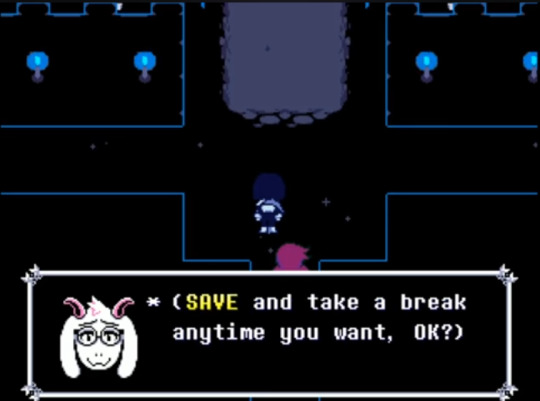
...eye candy…?
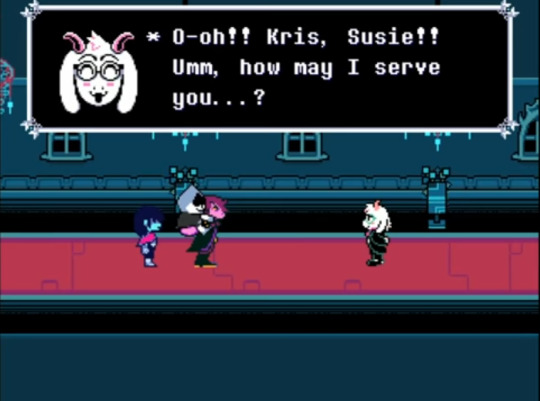
...and so on and so forth.
And so what, I hear you cry. Characters in video games can have more than one personality trait, after all. And yes, this is true! But usually, the different aspects of a character's roles, how they interact with, reinforce or contradict each other, can tell us more about their inner world - what motivates them, what they actively like and dislike... in short, it grants them depth and allows us to engage with them as actual people, rather than just a series of game functions and character traits dressed up in a pretty bow.
But that's not what we see with Ralsei. In fact, far from showing us any real, deep aspect of his character, each new guise he dons and part he plays in the narrative further obfuscates him from us. We learn no new meaningful information from any of these exchanges... except for one thing, but we'll come to that in a moment.
This vexes us, because we WANT to know more about him, but all we end up getting is stock JRPG tropes dressed up in a warm, fluffy coat. There HAS to be something deeper, we reason - he's hiding things from us, so he must be a secret villain. Or his backstory is so tragic, so traumatising, that he cannot properly articulate it to us right now. Or maybe what we see really IS what we get - a simpering, airheaded fool whose only desires in life are to be cute, please his betters and do what he's told. Yet even this explanation seems... unsatisfying, especially since we KNOW he harbours some angst about himself and his sense of identity.
And speaking of which, that one thing we learn? Right at the end of Chapter 2's Acid Tunnel sequence, he utters a single sentence:
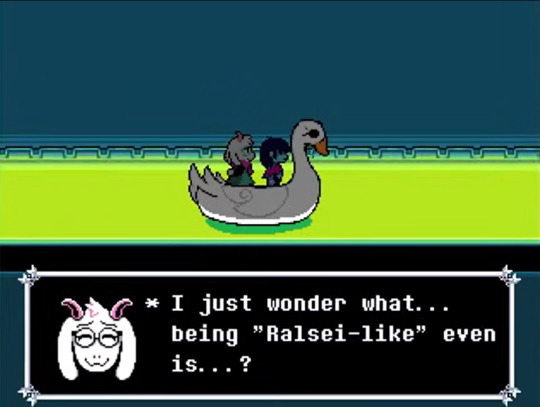
This is arguably one of the most significant lines of dialogue in the entire game up to this point. But what does it mean, exactly? I believe most people assume it means he doesn't have a clear sense of who he is outside of his ordained purpose, which is certainly valid, and definitely something I believed for a long time. And yet, this explanation does not deepen our understanding of his character in any meaningful way; looking back over all his interactions with the cast, it does not allow us to glean any further information about him.
And you can say that's because he himself doesn't know what he's like... but again, this doesn't actually change anything, and we just end up with a circular logic trap. We don't know anything because he doesn't tell us anything, and he doesn't tell us anything because he doesn't know anything, so how can we be expected to know anything, except that no-one seems to know anything about him… which is very frustrating to us Ralsei scholars, and gets us no closer to truly understanding him.
But look at what he says again. Really look at it. It’s a very strange way of saying “I don’t really know who I am”, isn’t it? After all, if that’s what he means, then why doesn’t he just say that? I’m certain you’ve realised by now, but it’s because that’s NOT what he’s saying at all. He literally has no clue what being “himself” is supposed to be, because he wasn’t even created with a sense of “Ralsei-ness” in the first place. Little wonder, then, that we can’t discern anything about his internal world, when there is nothing there to be discerned.
But before I elaborate any further, I want to talk about a couple of scenes in Deltarune that are just... puzzling. This is relevant, I promise. The first is during the dialogue with Rouxls Kaard before the rematch with K.Round. Ralsei says something interesting in the lead-up to the fight:
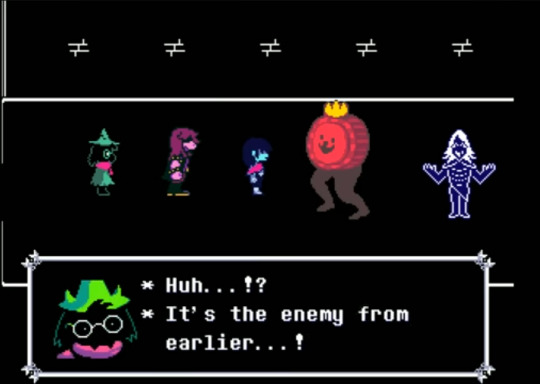

Note Susie’s baffled reaction to this. Then not long afterwards, he continues with:

Throwaway joke, right? We laugh because Susie's right - K. Round and its crown do look exactly the same to us, and so Ralsei's dramatic utterances are deflated and lose their impact. We laugh, beat the boss with Susie's help and forget all about it. But here's the thing - if K.Round looks the same to us, and it looks the same to Susie, and presumably by extension the rest of the in-game characters... when why exactly does Ralsei take the time to insist otherwise?
Is he... lying? Our most precious little boy, guilty of perjury? Say it ain't so! :O
The second scene is in chapter 2 - Queen has challenged us to a game of Punch-Out on her absurdly tall arcade machine, and we can talk to the characters before trying to interact with it. Talk to Ralsei, and if you answer "Gaming is my life" to his prompt, he says this:
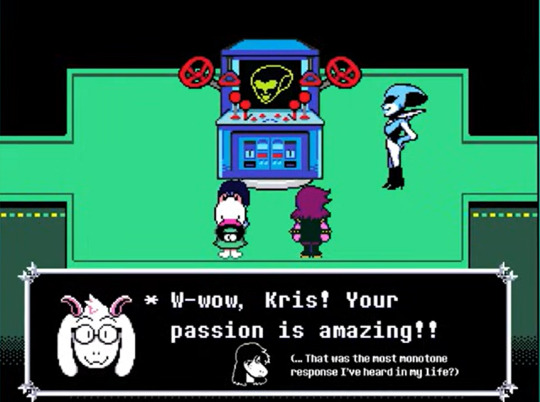
Most people don't even come across this in their playthrough, so I wouldn't be surprised if it's new to you reading this. But again, note this strange discrepancy between what Ralsei reports is happening and what Susie says is actually happening. It becomes apparent to most people that Kris can affect the tone of their voice when saying what we tell them to, which affects how the response is taken by other characters and gives us a subtle clue about how they actually feel about certain characters or situations.
Are we to assume, then, that Ralsei isn't actually listening to how Kris says things, but only what they're saying? And if that's correct, then... what does that say about him?
Taken at face-value, within the context of the game, neither of these events really make much sense. It just looks like Ralsei is being overly-dramatic, or lying, or perhaps even insensitive to what their friend is trying to tell him, which doesn't quite track with his per-established shallow traits of kind, all-loving and moralistic. It's perplexing and seemingly out-of-character for him. So it might help to consider, in each of these scenarios, who exactly Ralsei is talking to.
Is it Kris and/or Susie? This would make the most sense, but it's actually not that likely, considering the aforementioned discrepencies between his descriptions and Susie's observations. So is it himself? Again, if he can see things the same as everyone else in-game, that wouldn't make much sense, because then he's just saying stuff that... isn't true? Or in the latter example's case, just completely ignoring what Kris is saying, which doesn't seem to entirely gel with what we know about him.
So, who does that leave? Well, the only other person - or should I say entity - who is present for both of those scenes is... us. The player of Deltarune. And that might seem even stranger than the previous options, until you realise what it is he's actually doing - providing flavour text, additional exposition informing us of details that we wouldn't - or shouldn't - be able to make out on a pixelated display with no voice-acting, attempting to give us a richer sense of these events in order to increase our sense of immersion in the game and world of Deltarune. In effect, he's playing the part of a character in a role playing game, doling out “flavour text” that contradicts another character’s experience of the same scenes, and he's doing it entirely for OUR benefit. Not Kris’s, not Susie's – ours.
He tells us that K.Round's crown is different, and that it is in pain from its forced control, to try and increase the stakes of the fight, and to give us a motivation that's not "here's the exact same boss again lul". He responds to Kris's words the way he does, not because he doesn't understand the nuances of their tone, but to try and amp us up for the upcoming challenge, and to validate our choice when we select the dialogue option "Gaming is my life". Because we cannot hear Kris's tone of voice - and Ralsei knows that. To him, Kris's tone literally doesn't matter, because he doesn't believe it matters to us in that exact moment.
And here’s the thing: if not for Susie’s asides immediately contradicting him, we’d likely take what he says here as what’s actually going on. To Ralsei, the reality he and his friends experience is not important – it’s the image of that reality that he’s trying to convey to the player. It’s like he knows he’s part of a game, meant just for us to experience and enjoy, as opposed to a real world filled with real people having real experiences.
And the reason I brought this up is to illustrate what I believe Ralsei to actually be - namely, that he a walking, talking, singing and dancing amalgam of stock JRPG characters and tropes that's trying very hard to present as an actual person, to the point of knowing absolutely nothing about who he even is outside of that. Put in even blunter terms, he's literally a fluffy goat-shaped vehicle to set the player on their journey through the game, to keep them playing and to keep them invested. People looking for deeper aspects of his character come up short and are disappointed because they're looking for something that does not currently exist.
And just so that I'm clear, I do not mean that Ralsei is "acting", or that he's "wearing a mask", because that would imply that there was actually something underneath his "facade" to begin with. No, this is who the Prince of the Dark is - a very convincing fascimile of a person, following his directive to ensure that the story of Deltarune is resolved, and that the game of Deltarune is played to completion. And once you realise that, a lot of things that Ralsei says and does that seemed strange before suddenly make a lot more sense.
As for the why... well, that'll have to wait for another time. But hopefully you can begin to see how my future essays in this series all tie in to this one, because I think you can only really understand those with the framework that this text provides. I hope that my reasoning made sense and wasn't too difficult to follow, but I'll be happy to provide additional information, clarification, or even just discussion on any aspect of this essay... even if we just wind up (respectfully) agreeing to disagree. Would love to hear what people thought about this!
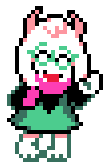
Thanks for reading!
#Writing#essay#analysis#theory#Deltarune#Ralsei#character study#The RalsAlmanac#deltarune chapter 1#deltarune chapter 2#essay collection
32 notes
·
View notes
Text

Virginia Woolf, from A Room of One’s Own
7K notes
·
View notes
Text
History is full of people who just didn’t. They said no thank you, turned away, ran away to the desert, stood on the streets in rags, lived in barrels, burned down their own houses, walked barefoot through town, killed their rapists, pushed away dinner, meditated into the light.
— Anne Boyer, from "No," published on the Poetry Foundation blog
4K notes
·
View notes
Photo
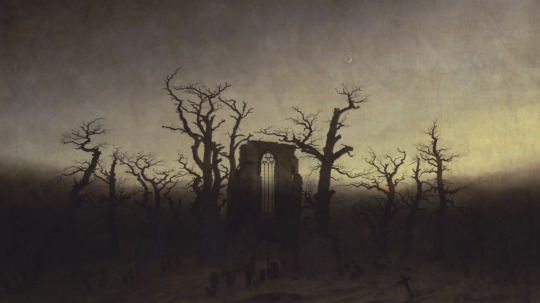
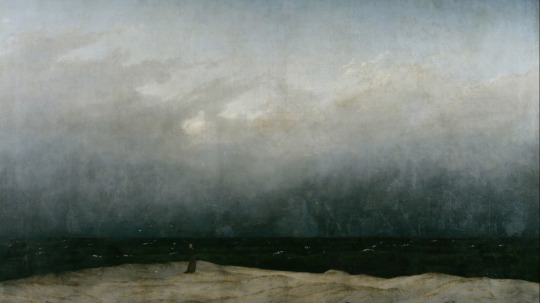

Now is the winter, Caspar David Friedrich
1K notes
·
View notes
Text
this house may or may not be real
on grayness in real estate
Allegedly, somewhere in Wake Forest, North Carolina, a 4 bed, 5.5 bathroom house totaling more than 6,600 square feet is for sale at a price of 2.37 million dollars. The house, allegedly, was built in 2021. Allegedly, it looks like this:
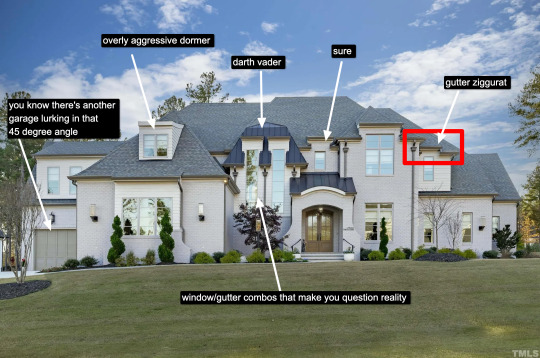
A McMansion is, in effect, the same house over and over again - it's merely dressed up in different costumes. In the 90s, the costume was Colonial; in the 2000s, it was vague forms of European (Tuscan, Mediterranean), and in the 2010s it was Tudor, dovetailed by "the farmhouse" -- a kind of Yeti Cooler simulacra of rural America peddled to the populace by Toll Brothers and HGTV.
Now, we're fully in the era of whatever this is. Whitewashed, quasi-modern, vaguely farmhouse-esque, definitely McMansion. We have reached, in a way, peak color and formal neutrality to the point where even the concept of style has no teeth. At a certain moment in its life cycle, styles in vernacular architecture reach their apex, after which they seem excessively oversaturated and ubiquitous. Soon, it's time to move on. After all, no one builds houses that look like this anymore:
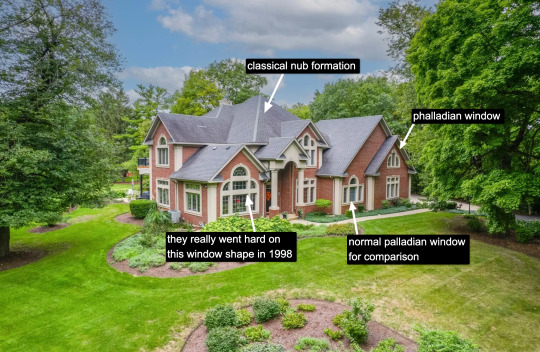
(This is almost a shame because at least this house is mildly interesting.)
If we return to the basic form of both houses, they are essentially the same: a central foyer, a disguised oversized garage, and an overly complex assemblage of masses, windows, and rooflines. No one can rightfully claim that we no longer live in the age of the McMansion. The McMansion has instead simply become more charmless and dull.
When HGTV and the Gaineses premiered Fixer Upper in 2013, it seemed almost harmless. Attractive couple flips houses. Classic show form. However, Fixer Upper has since (in)famously ballooned into its own media network, a product line I'm confronted with every time I go to Target, and a general 2010s cultural hallmark not unlike the 1976 American Bicentennial - both events after which every house and its furnishings were somehow created in its image. (The patriotism, aesthetic and cultural conservatism of both are not lost on me.)
But there's one catch: Fixer Upper is over, and after the Gaineses, HGTV hasn't quite figured out where to go stylistically. With all those advertisers, partners, and eyeballs, the pressure to keep one foot stuck in the rural tweeness that sold extremely well was great. At the same time, the network (and the rest of the vernacular design media) couldn't risk wearing out its welcome. The answer came in a mix of rehashed, overly neutral modernism -- with a few pops of color, yet this part often seems omitted from its imitators -- with the prevailing "farmhouse modern" of Magnolia™ stock. The unfortunate result: mega-ultra-greige.
Aside from war-mongering, rarely does the media manufacture consent like it does in terms of interior design. People often ask me: Why is everything so gray? How did we get here? The answer is because it is profitable. Why is it profitable? I'd like to hypothesize several reasons. The first is as I mentioned: today's total neutrality is an organic outgrowth of a previous but slightly different style, "farmhouse modern," that mixed the starkness of the vernacular farmhouse with the soft-pastel Pinterest-era rural signifiers that have for the last ten years become ubiquitous.
Second, neutrals have always been common and popular. It's the default choice if you don't have a vision for what you want to do in a space. In the 2000s, the neutrals du jour were "earth tones" - beige, sage green, brown. Before that, it was white walls with oak trim in the 80s and 90s. In the 70s, neutrals were textural: brick and wood paneling. We have remarkably short memories when it comes to stylistic evolution because in real time it feels incremental. Such is the case with neutrals.
Finally, the all-gray palette is the end logic of HGTV et al's gamified methodology of designing houses with commodification in mind: if you blow out this wall, use this color, this flooring, this cabinetry, the asking price of your house goes up. You never want to personalize too much because it's off-putting to potential buyers. After twenty years of such rhetoric, doesn't it make all the sense in the world that we've ended up with houses that are empty, soulless, and gray?
A common realtor adage is to stage the house so that potential buyers can picture their own lives in it. In other words, create a tabula rasa one can project a fantasy of consumption onto. Implied in that logic is that the buyer will then impose their will on the house. But when the staged-realtor-vision and general-mass-market aesthetic of the time merge into a single dull slurry, we get a form of ultra-neutral that seems unwelcoming if not inescapable.
To impose one's style on the perfect starkness is almost intimidating, as though one is fouling up something untouchable and superior. If neutrality makes a house sell, then personality - at all - can only be seen as a detriment. Where does such an anti-social practice lead us? Back to the house that may or may not exist.
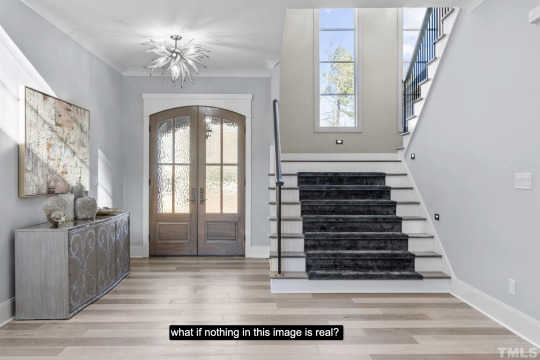
In my travels as McMansion Hell, I've increasingly been confronted with houses full of furniture that isn't real. This is known as virtual staging and it is to house staging as ChatGPT is to press release writing or DALL-E is to illustration. As this technology improves, fake sofa tables are becoming more and more difficult to discern from the real thing. I'm still not entirely sure which of the things in these photos are genuine or rendered. To walk through this house is to question reality.
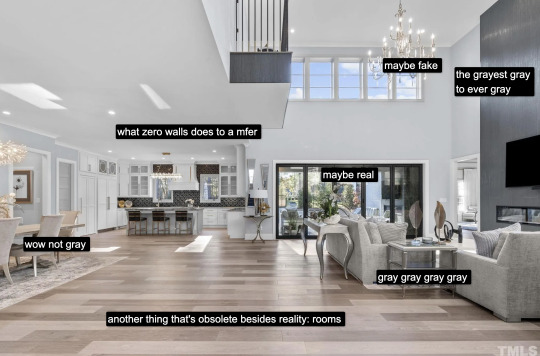
Staging ultimately pretends (sometimes successfully, sometimes not) that someone is living in this house, that you, too could live in it. Once discovered, virtual staging erases all pretensions: the house is inhabited by no one. It is generally acknowledged (though I'm not sure on the actual statistics) that a house with furniture - that is, with the pretense of living -- sells easier than a house with nothing in it, especially if that house (like this one) has almost no internal walls. Hence the goal is to make the virtual staging undiscoverable.
If you want to talk about the realtor's tabula rasa, this is its final form. Houses without people, without human involvement whatsoever.
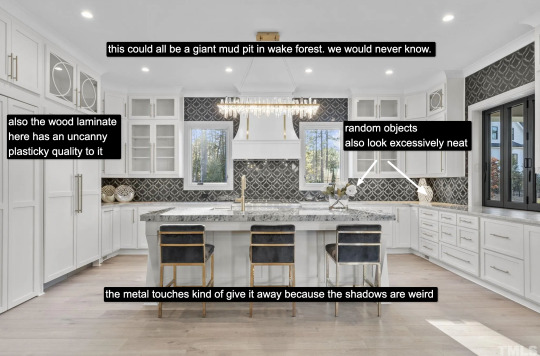
But what makes this particular house so uncanny is that all of these things I've mentioned before: real estate listing photography, completely dull interiors and bland colors all make it easy for the virtual furniture to work so well. This is because the softness of overlit white and gray walls enables the fuzzy edges of the renderings to look natural when mixed with an overstylized reality. Even if you notice something's off in the reflections, that's enough to cause one to wonder if anything in the house is real: the floors, the fixtures, the moulding, the windows and doors.
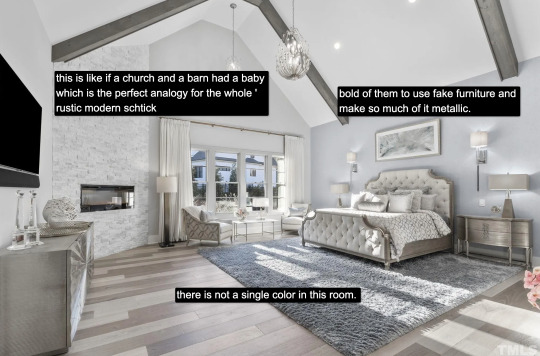
This is where things are heading: artifice on top of artifice on top of artifice. It's cheap, it's easy. But something about it feels like a violation. When one endeavors to buy a house, one assumes what one is viewing is real. It's one thing if a realtor photoshops a goofy sunset, it's another to wonder if anything in a room can be touched with human hands. I won't know what, if any, part of this estate costing over 2 million dollars actually exists until I visit it myself. Perhaps that's the whole point - to entice potential buyers out to see for themselves. When they enter, they'll find the truth: a vast, empty space with nothing in it.
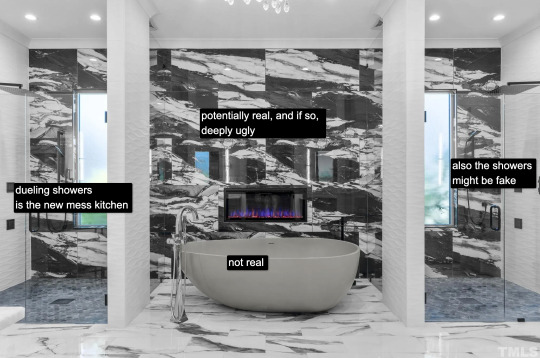
The better this rendering technology gets, the more it will rely on these totally neutral spaces because everything matches and nothing is difficult. You are picking from a catalog of greige furniture to decorate greige rooms. If you look at virtual staging in a non-neutral house it looks immediately plastic and out of place, which is why many realtors opt to either still stage using furniture or leave the place empty.
Due to the aforementioned photography reasons, I would even argue that the greigepocalypse or whatever you want to call it and virtual staging have evolved simultaneously and mutualistically. The more virtual staging becomes an industry standard, the more conditions for making it seamless and successful will become standardized as well.
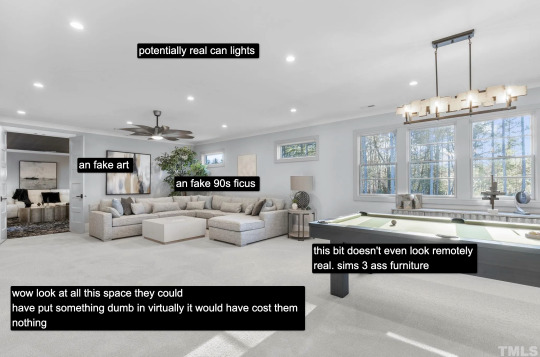
After all, real staging is expensive and depends on paid labor - selecting furniture, getting workers to deliver and stage it, only to pack it back up again once the property is sold. This is a classic example of technology being used to erase entire industries. Is this a bad thing? For freelance and contract workers, yeah. For realtors? no. For real estate listings, it remains to be seen. For this blog? Absolutely. (Thankfully there is an endless supply of previously existing McMansions.)
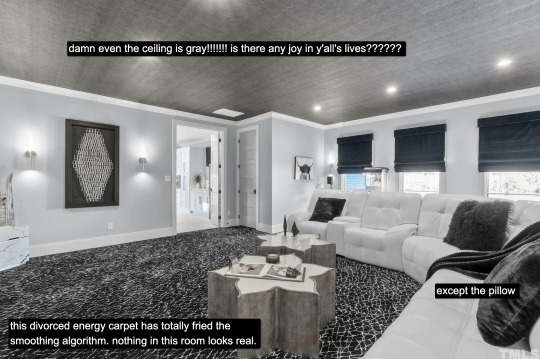
The thing is, real estate listings no longer reflect reality. (Did they ever to begin with?) The reason we're all exasperated with greige is because none of us actually live that way and don't want to. I've never been to anyone's house that looks like the house that may or may not exist. Even my parents who have followed the trends after becoming empty nesters have plenty of color in their house. Humans like color. Most of us have lots of warmth and creativity in our houses. Compare media intended for renters and younger consumers such as Apartment Therapy with HGTV and you will find a stark difference in palate and tone.
But when it comes to actually existing houses - look at Zillow and it's greige greige greige. So who's doing this? The answer is real estate itself aided by their allies in mass media who in turn are aided by the home renovation industry. In other words, it's the people who sell home as a commodity. That desire to sell has for some time overpowered all other elements that make up a home or an apartment's interiority to the point where we've ended up in a colorless slurry of real and unreal.
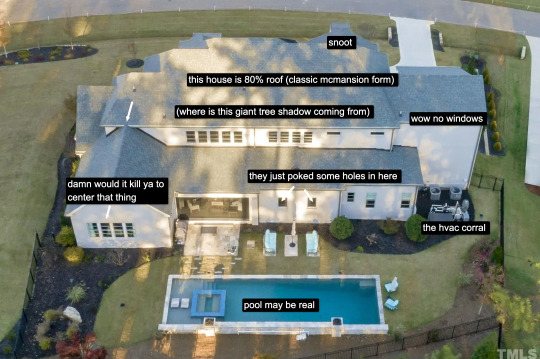
Fortunately, after ten years or so, things begin to become dated. We're hitting the ten year mark of farmhouse modernism and its derivatives now. If you're getting sick of it, it's normal. The whole style is hopefully on its last leg. But unlike styles of the past, there's a real, trenchant material reason why this one is sticking around longer than usual.
Hence, maybe if we want the end of greige, we're going to have to take color back by force.
If you like this post and want more like it, support McMansion Hell on Patreon for as little as $1/month for access to great bonus content including extra posts and livestreams.
Not into recurring payments? Try the tip jar, because media work is especially recession-vulnerable.
10K notes
·
View notes
Text
The Final 15 - Aziraphale’s Perspective
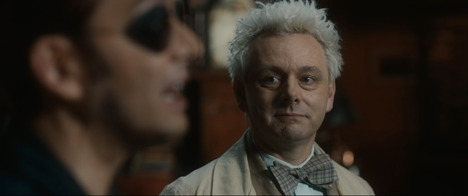
I see a lot of empathy for Crowley’s experience during the final 15 minutes of season 2 and it makes sense that we feel deeply for him. What he is experiencing is very human - acknowledging the depth of his own feelings, plucking up the courage to say something, having it come out all wrong, feeling utterly rejected, and then walking away in a mix of pain and anger. Who among us hasn’t been there?
But Aziraphale is experiencing something more complicated, something fewer of us have analogs for. Aziraphale has internally acknowledged his feelings for Crowley for some period of time, probably at least since 1941. Michael Sheen confirms this mental state in a NYCC 2018 interview:
“I decided early on that Aziraphale just loves Crowley. And that’s difficult for him because they are on opposite sides and he doesn’t agree with him on stuff. But it does really help as an actor to go, ‘My objective in this scene is to not show you how much I love you and just gaze longingly at you.’”
Unlike Crowley, Aziraphale’s struggle isn’t acknowledging his feelings. His struggle appears to be two-fold: 1) believing that Crowley could ever love him back and 2) even if Crowley did love him, believing a future for the two of them together could exist within the restrictions of his larger world view.
Can Crowley love?
Angels are, traditionally, beings of love. We see Aziraphale embody this time and again, showing kindness and support to almost everyone he meets, including the amnesiac Gabriel who has treated him abominably in the past. He is attuned to love, remarking on how the area around Tadfield “feels loved” twice in Season 1. As for how Aziraphale personally understands and expresses love, he shows his love to others through verbal affirmation and, to a lesser extent, physical touch. There are many examples of Aziraphale expressing his love for Crowley through positive verbal affirmation, typically by praising him for instances where he has been kind, nice, or good. And on the rare occasions when Aziraphale receives verbal praise, he
absolutely interprets it as an expression of love, blossoming with happiness.
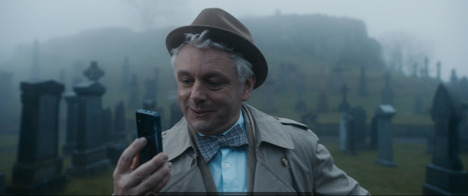
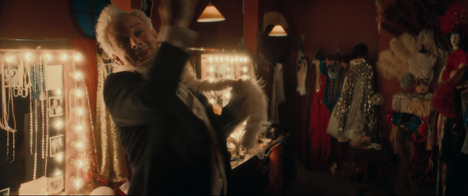
But from Aziraphale’s perspective, it may be unclear if Crowley can feel love in the same way. Can demons love? Did he lose that capability when he fell? Crowley can’t feel the aura of love in Tadfield that Aziraphale remarks on, and his reactions to Aziraphale’s praise are always to shrug it off, tell Aziraphale to “shut up,” or in the most extreme case to physically slam him against a wall and get in his face about it. In this last instance he tells Aziraphale, “I’m a demon, I’m not nice. I'm never nice. Nice is a four-letter word.” A four-letter word, like love, that is not in Crowley’s self-defined vocabulary.
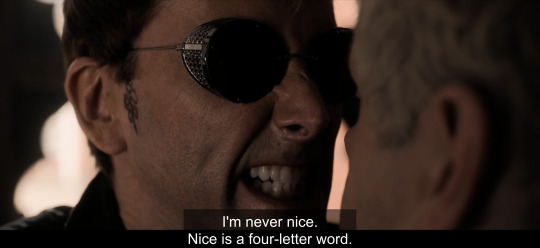
If Crowley can feel love, does he love Aziraphale?
Even if Aziraphale believes Crowley is capable of feeling love, he does not always recognize how Crowley expresses it in the moment. Crowley shows his love for Aziraphale through actions, but Aziraphale often misconstrues Crowley’s motivations. In 1793 when Crowley rescues him from the Bastille, Aziraphale initially assumes Crowley is only there because he is responsible for the Reign of Terror. Similarly, in 1941, Aziraphale’s reaction to Crowley’s appearance is to assume he’s just part of the Nazi gang, saying,“I should have known. Of course. These people are working for you!”
Crowley doesn’t help matters in this regard because he is constantly muting and undercutting his signals to Aziraphale. Every time Crowley expresses his love for Aziraphale through actions - rescuing him, saving his books, even taking him to lunch - he does so in a nonchalant, dismissive manner, indicating he ascribes little value or importance to the actions he has performed. “I just didn’t want to see you embarrassed,” he says when he appears in 1941. And when Aziraphale positively glows with happiness about his books being saved, Crowley tells him to “shut up."On top of these confusing signals, Crowley is almost pathologically incapable of expressing his feelings in the verbal love language that Aziraphale can understand. This is heartbreakingly demonstrated in this scene after the bookshop fire:
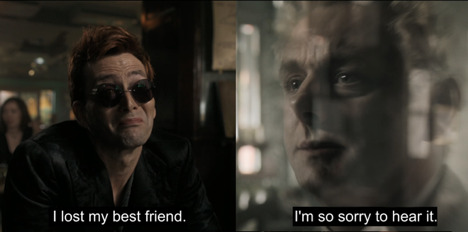
Crowley can’t even say “I lost you.” Instead he speaks of Aziraphale in the third person while sitting in front of him, saying, “I lost my best friend.” The little hitch on Aziraphale’s face when he hears this is just devastating. Who is Crowley talking about? The last conversation they had before this scene was when Aziraphale called while Hastur was in Crowley’s apartment and Crowley said, “Not a good time - got an old friend here.” Aziraphale is left to wonder - is that who Crowley means when he says "best friend?" Crowley is everything to Aziraphale, but what is he to Crowley?
How Would It Even Work?
Even when Aziraphale does get flashes of the possibility that Crowley may care for him he immediately runs up against his second mental block - there is no world he can imagine where they could be together. When Crowley first suggests running off together in the bandstand scene in S1E3, Aziraphale collapses under the thought: “Friends? We aren’t friends. We are an angel and a demon. We have nothing whatsoever in common. I don’t even like you.”
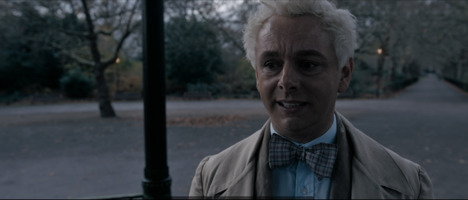
While he is obviously in denial, Aziraphale is also under tremendous stress in this moment and is desperately trying to hold onto some stability by falling back onto his world view and ideology. In this state he backpedals all the way to “I don’t even like you.” In his understanding of the way the universe is supposed to work, he and Crowley are hereditary enemies and should not even be friends, much less in love. Aziraphale expresses this core belief throughout the series. What kind of existence could they ever have together in reality?
The Final 15
With this as a background, we can better understand what Aziraphale experiences in the final 15 minutes. Even before the Metatron enters the scene, Aziraphale begins to have his fundamental beliefs challenged which puts him off his footing. The revelation that Gabriel and Beelzebub are in love is deeply impactful. When Beelzebub says “I just found something that mattered more to me than choosing sides” and takes Gabriel’s hand, Aziraphale immediately reaches out to make contact with Crowley, a look of incredulity on his face. Here is proof that demons can feel love and that an angel and a demon can carve out a space together. The road may be difficult, but it is not impossible.
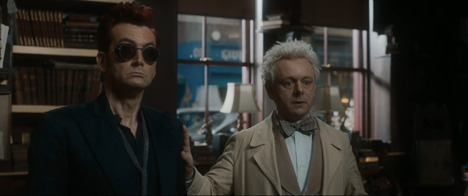
Before Aziraphale can digest this revelation the stakes are ratcheted up: Michael threatens to erase Aziraphale from the Book of Life due to his part in hiding Gabriel. The future that Aziraphale has just barely glimpsed is already under siege. It is at this point that The Metatron enters, offering Aziraphale not just survival and protection, but a version of everything he has ever wanted.
If Crowley is reinstated as an angel, Aziraphale will no longer have to wonder whether Crowley is capable of feeling love. And if they are both angels, there will be no conflict inherent in having a life together. In one fell swoop, the Metatron entices Aziraphale with a future where there are no remaining blockers to an eternal, loving existence with Crowley. It will be “like the old times, only even nicer” because they now have millennia of their shared history to build on together. Of course this logic is horribly flawed and does not take into account at all what Crowley wants, but in the moment it must feel like an enormous gift to Aziraphale.
Unfortunately, not only is Crowley’s reaction to this “incredibly good news” not what Aziraphale expects, the conversation quickly takes a baffling turn for him. Crowley shuts down the talk about returning to heaven and attempts to say what he wants to say. Sadly he once again utterly fails to speak in a way that Aziraphale can understand.
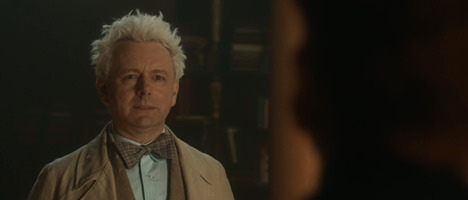
The audience knows what Crowley is trying to say because we have the context of his earlier conversation with Maggie and Nina. But Aziraphale lacks that and thus can’t understand where this is coming from or what it means. Rather than expressing his feelings as Beelzebub and Gabriel did, Crowley recites facts: we’ve known each other a long time, we’ve been on this planet a long time, I could always rely on you, you could always rely on me. He can’t even say the word “couple” when he describes them, referring to them more as colleagues with words like “team” and “group.” And the one time he does try to express his feelings and desires he is physically unable to get out the words: “And I would like to spend—.” He then retreats into his old plea to turn away from heaven and hell and run off together. Nowhere in Crowley’s confession does Aziraphale hear “I love you” or even “I want to be with you.” What he hears instead is what he’s heard multiple times before - Crowley wants to abandon both heaven and hell and default to just the two of them. From Aziraphale’s perspective this will not solve anything for them. They will still be an angel and a demon, at some level fundamentally separated by their very natures.
Having failed in his speech, Crowley then does two things in rapid succession that must be excruciatingly painful for Aziraphale. First, he does the opposite of verbal affirmation by calling Aziraphale an idiot. We have seen Aziraphale become physically radiant in the rare instances where Crowley has praised him, so a direct insult like this must feel poisonous. Then Crowley makes a last desperate attempt to communicate through Aziraphale’s other love language - physical touch - by initiating the kiss. But without context or understanding of what is behind it, Aziraphale can initially only experience it as forceful, angry, and shocking. With more time to parse it I think Aziraphale will come to understand Crowley’s meaning, but in the moment it must feel manipulative and borderline cruel.
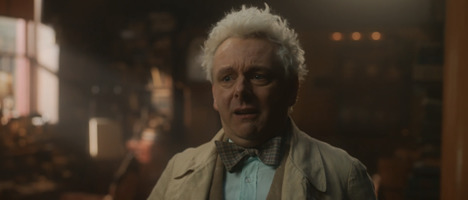
The Results
In a very compressed time frame, Aziraphale has to move quickly and radically through multiple mental and emotional states. For 6000 years he has believed he and Crowley cannot be together. Suddenly, with the revelation of Gabriel and Beezlebub, that foundational belief is challenged. Before he can work through what that could mean for him and Crowley, the Metatron offers an even cleaner solution - they can be protected from retribution and be on the same side again. When Crowley rejects reinstatement wholesale, it makes Aziraphale feel that he and his loving offer of a life together have been personally rejected. Then that rejection is further confused through the shocking experience of the kiss which Aziraphale does not have adequate context for or time to understand and integrate. In his emotional turmoil, Aziraphale falls back on his default crutch for dealing with sadness and anger - forgiveness - which further cuts him off from Crowley. Taken all together, this is a tumultuous rollercoaster of whiplash emotions that pull at every part of Aziraphale's self- and world-views.
Compared to what Crowley is going through, I think Aziraphale is going to have the tougher road in Season 3. Crowley may still need to better reconcile and integrate his feelings for Aziraphale, but Aziraphale has 6000 years of foundational ideology to challenge and evolve to reach a place where he and Crowley can be together as their authentic selves.
#good omens#aziraphale#crowley#aziracrow#ineffable husbands#good omens meta#good omens 2#gomens#essay#final 15#crowly x aziraphale#good omens s2#good omens season 2
1K notes
·
View notes
Link
In a new Longreads essay, Arkansas writer Jordan P. Hickey writes about a Palestinian American chef who honors her family's roots and culinary traditions through her pop-up bakery and cooking classes
And while these aren’t the most complex dishes to grace the text thread, they are the most remarkable, the most joyful, because they are the most improbable. They’re celebrated not because they’re beautiful, but because it means the family ate well that day—because they made something out of nothing.
Read Jordan’s essay, “The Expanding Table: Honoring Palestinian Culinary Tradition in Arkansas,” on Longreads.
#longreads#reading#food#baking#cooking#dessert#middle eastern#palestinian#gaza#arkansas#chef#longform#essay
2K notes
·
View notes
Text
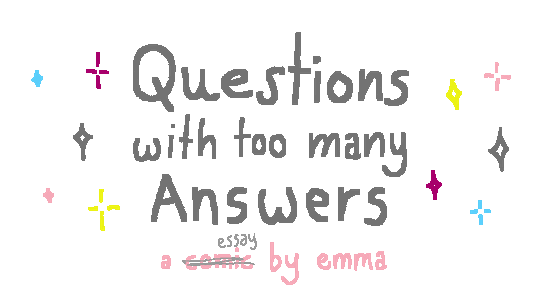

I don’t shave every day. It’s not that I don’t “need” to; I have very dark, dense facial hair that grows quickly and remains pretty visible after shaving. When I do shave, I don’t try to cover it with makeup (beyond some powder to reduce redness). In most other ways I present very feminine, but I always have fairly obvious facial hair.
And it makes me feel terrible.
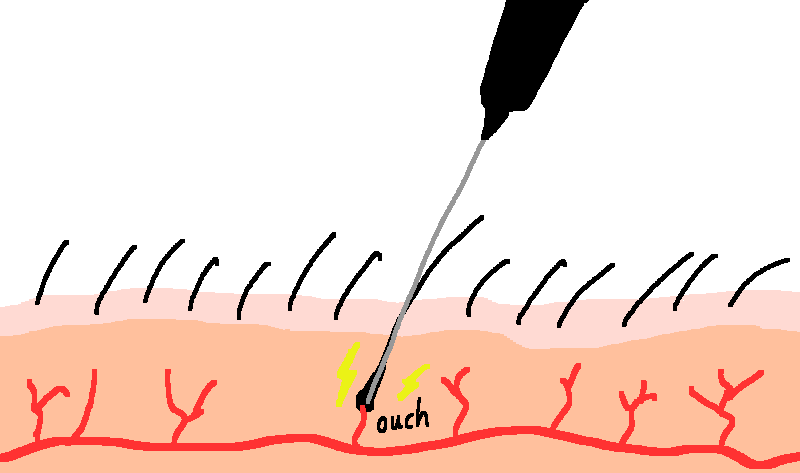
I started electrolysis a couple months ago. It’s excruciatingly painful, expensive, and it takes forever. In an hour-long session, my electrologist is able to remove hair in only a small region (about 1 square inch). A few weeks later, much of that hair comes back. I am told that it will take two to three years of regular treatments to remove it entirely. On top of that, I apparently have a condition called Post Inflammatory Hyperpigmentation, which causes the skin in affected areas to darken after treatment. For nearly two months after completing a single pass over my upper lip, my mustache was more visible than it had ever been, despite having significantly less hair.
And it made me feel terrible.
I know this is the best way for me to permanently remove my facial hair, but I just canceled all of my upcoming sessions and at the moment I have no plans to begin again.
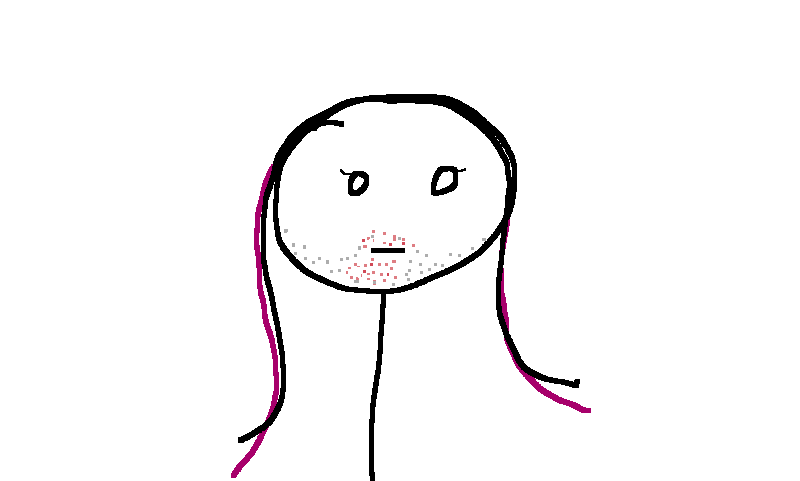
If I could pay to have my facial hair instantly and completely removed I would empty my savings account. I am intensely aware of it any time I go out in public. If it makes me so uncomfortable, why do I not do more to hide it?

I feel incredibly privileged for a trans woman. I have a loving, supportive family. I have a well-paying job. I live in a very accepting area. I have never had a single person say anything negative to me about my gender identity, which was certainly not what I was expecting when I came out. It is important to me that I be visibly queer, and in my privileged position I am able to do that without fear. A year ago I didn’t think I would ever transition; now I want people to know that I’m trans.
I am disappointed with myself for wanting to remove my facial hair, for changing my voice. I am determined not to have to do more work than a cis person does. Cis women don’t have to shave their face every day. Cis men don’t have to shave their face every day. Why should I? This is who I am, what my body does. Shouldn’t I be proud of that? Am I not supposed to love myself the way I am?
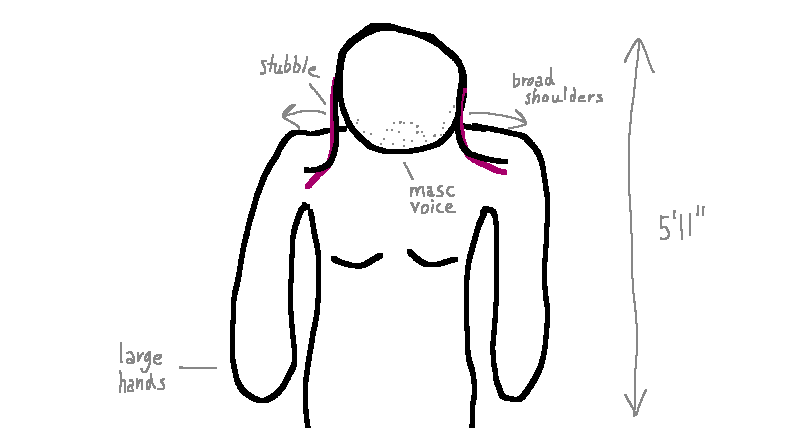
But by that logic, why am I even transitioning in the first place?
I am doing more work than a cis person does. Cis people don’t transition, and transitioning takes effort. I know that there are cis people, both men and women, who do shave every day. Am I lying to myself? I’m a trans woman; aren’t I supposed to want to get rid of my facial hair? Shouldn’t I be trying harder? Doesn’t this give me dysphoria? Am I pretending not to have dysphoria so I don’t have to put in the effort? Does the fact that I’m not trying harder make me… I don’t know, less trans? Non-binary? Is it ok for me to call myself a trans woman? Am I lying to myself?

As a woman who was a man until thirty, there are things about my body that I must accept, that I won’t be able to change no matter how much money I dump into my transition. I’m tall, I have broad shoulders, I have large hands. No amount of surgery or hormones will change these things.
But there are many things that I can change, and while none of them are requirements for being a woman, they may still be changes that I want to make. Where do I stop? Am I finished transitioning when I’ve done everything that is physically possible? My goal isn’t to “pass,” at least not in the way that word is generally used. In a time when cis women are being assaulted because people think they’re trans—because they don’t “pass” as women—the idea of what it means to pass becomes blurry. Often when we say that we want to pass, what we really mean is that we want to be conventionally beautiful.
I am a woman. Therefore, I look like a woman. My transition goal is to pass as myself. I’ve spent the last year trying to figure out who I am so I can look like her. I don’t care whether people see me and think “that’s a woman.” I want to be able to look in the mirror and think “that’s me.” But it can be extremely difficult to separate your own image of yourself from society’s idea of what you should look like. Am I self-conscious about the size of my body because it doesn’t feel like me, or because I’ve been told that women should be smaller? There are tall cis women, there are broad-shouldered cis women, there are cis women with large hands. Those traits don’t make them less womanly.

For the aspects of my body that I do have control over, I am stuck wondering whether I am changing things to become myself, or changing them because I have internalized that the way I am is wrong. At the moment, facial feminization surgery is something that I think I might like to do. But how do I know that I want to do it for the right reasons? I don’t hate my face, but when I catch a glimpse of myself from certain angles I can’t help but think that it isn’t feminine enough. What I should be asking is if it’s Emma enough, but how can I know that? How do I know who I’m supposed to be?
I feel like I was supposed to be a cis woman, but… why? Who am I to say that I wasn’t supposed to be trans? That I wasn’t supposed to transition at thirty, to have both a male puberty and a female one? Being trans has made me more self-aware, more open-minded, more empathetic. The totality of my experience is what makes me who I am. Maybe there’s a world in which I was assigned female, maybe there’s a world in which I was put on puberty blockers as a kid. But the girl in those worlds isn’t me.
Loving yourself and wanting to change are two feelings that can coexist. I tend to think of body positivity as simply accepting yourself as you are, but it is more nuanced than that. As a trans person, who I am inside is not the same as who I am outside. Which one am I supposed to love? I do love myself, but I also love who I could be. I’m transitioning so that someday they’ll be the same person.

Over the past year I have become both my biggest supporter and my biggest critic. I constantly tell myself how pretty I am, how brave I am, how fucking cool I am (hey, nobody else is saying it and it’s true). This forced positivity has been fantastic for me. I can confidently say that I truly love myself for the first time in my life. But I sometimes feel guilty that I don’t love myself more.
I can’t help but stare at myself in the mirror all the time now. I actually bought a new mirror so I didn’t have to walk as far to do so. I’ve taken more selfies than I did in my entire pre-transition life. After many months on HRT, I finally see myself in my reflection. But my eyes refuse to focus on my stubble. Sometimes I catch myself thinking “I’m going be so beautiful once I get rid of this facial hair,” and it feels like a betrayal. Fuck you Emma, I’m already gorgeous.
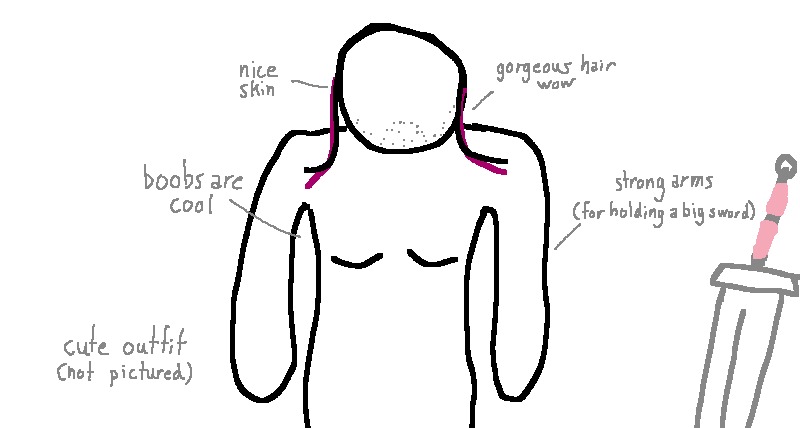
1K notes
·
View notes
Text
The Abuser's Guide to Transmisogyny
aka "How to Cancel a Trans Girl", an essay about the tactics transmisogynists use to ruin their victims' lives framed as a satirical how-to guide.
i wrote this last year, but i've been reminded of it recently, and it remains relevant. you can read it on my website:
1K notes
·
View notes
Text
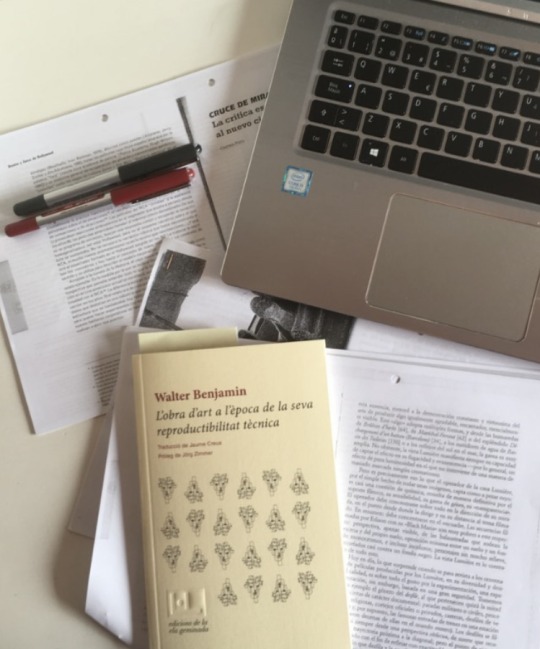

I am currently working on an essay on Walter Benjamin's "The Work of Art in the Age of Mechanical Reproduction".
#study#studyblr#study blog#studygram#student#college#university#essay#studyblr community#studyspo#Walter Benjamin#book#bookblr#bookstagram#reader#writer#writers community#writers on tumblr#neutral palette
641 notes
·
View notes
Text
PSA to anyone writing an essay at ANY level:
please, for the love of god, integrate your quotes properly. don't just drop them in the middle of nowhere D:
it's very easy:
Step 1: Introduce the Author of the Quotation (Who/where is it from)
Step 2: State the Quotation (the quote)
Step 3: Summarize the Quotation (paraphrase it)
Step 4: Analyze the Quotation (Break down the meaning)
Step 5: State the Quotation’s Relevance to Your Argument (Why did you just share this quote how is it related to your essay?)

Here's another example:
After talking with Cherry, a girl from the opposing group, Ponyboy, the main character in The Outsiders, by S.E Hinton, observes, "Maybe the two different worlds we lived in weren't so different. We saw the same sunset" (Hinton, 78). In other words, after talking, they realized they had more things in common than they thought. This shows that one of the reasons the two groups keep fighting is that they don't really ever communicate with each other. This is a reflection of our society today, where people discriminate against each other based on stereotypes, without actually ever communicating with each other.
Its an easy formula to follow and literally makes your writing sound so much clearer PLEASE just DO it and SAVE THE EYES of your teachers today
- sincerely a teacher who is TIRED OF SEEING quotes that have been parachuted into a sentence and no one knows who said it or why you added it in your paper PLEASE we want to give you good grades help us out 😭😭😭
762 notes
·
View notes